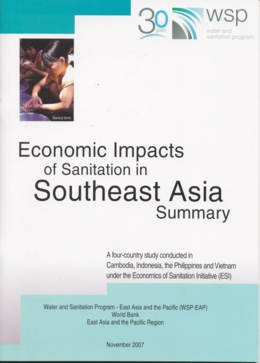Kategori Digilib
Economic Impacts of Sanitation in Southeast Asia Summary: A four-country study conducted in Cambodia, Indonesia, the Philippines and Vietnam under the Economics of Sanitation Initiatives (ESI)

Water and Sanitation Program – East Asia and the Pacific (WSP-EAP) World Bank East Asia and the Pacific Region, 23 hal, November 2007
Th. 2007
363.72 WAT e
studi kasus, sanitasi, dampak ekonomi, Asia Tenggara
Perpustakaan AMPL
1.398 kali
The Sanitation Impact Study was conducted in
This study examines the major health, water, environmental, tourism and other welfare impacts associated with poor sanitation in
of poor sanitation can be mitigated by investing in improved sanitation.
The study is based on evidence from other investigations, surveys and databases. The impact measurement reported in the study focuses mainly on a narrow definition of sanitation - human excreta management and related hygiene practices. The measurement of water resource impact included release of gray water to water bodies, and the measurement of environmental impact included poor solid waste management.
ecological sanitation approaches (fertilizer and biogas) would be worth an estimated US$270 million annually.
Daftar Isi:
Acknowledgments
Executive Summary
1. Introduction
2. Methods
2.1 Study Approach
2.2 Scope of ’Sanitation’
2.3 Impacts Evaluated
2.4 Impact Mitigation
3. Results
3.1 Health Impacts
3.2 Water Impacts
3.3 Environmental Impacts
3.4 Other Welfare Impacts
3.5 Tourism Impact
3.6 Overall Economic Impacts
4. Recommendations
Annex
Abbreviations
Tables
Figures
